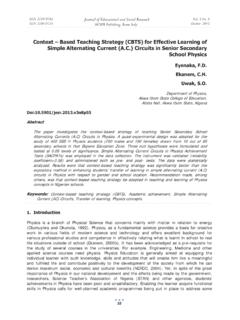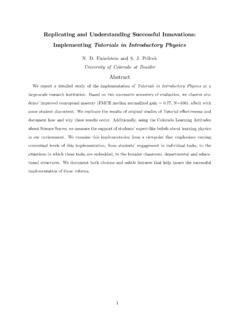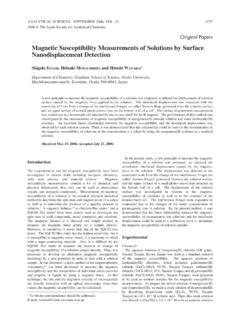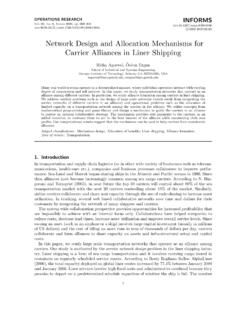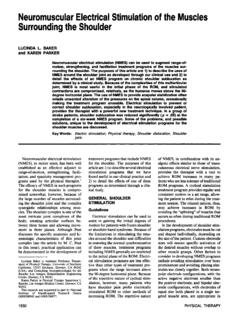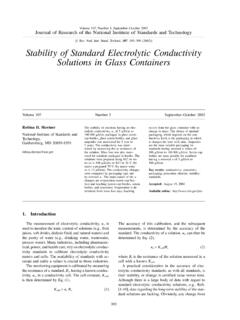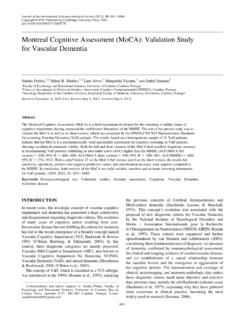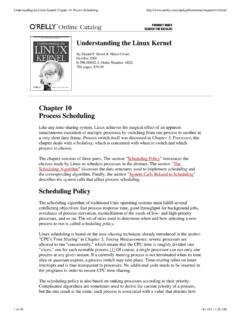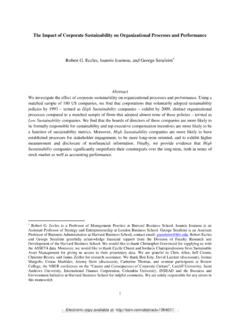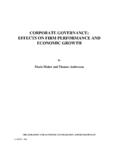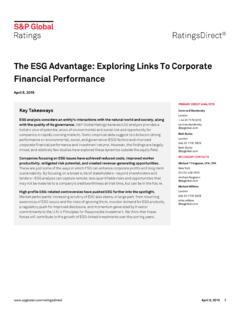Transcription of Diversification as a Corporate Strategy and Its Effect on ...
1 International Journal of Economics and Finance; Vol. 6, No. 5; 2014 ISSN 1916-971X E-ISSN 1916-9728 Published by Canadian Center of Science and Education 182 Diversification as a Corporate Strategy and Its Effect on Firm performance : A Study of Zimbabwean Listed Conglomerates in the Food and Beverages Sector Mashiri Eukeria1 & Sebele Favourate2 1 Midlands State University, Zimbabwe 2 National University of Science and Technology, Zimbabwe Correspondence: Mashiri Eukeria, Midlands State University, Pox Bag 9055, Gweru, Zimbabwe.
2 E-mail: Received: January 2, 2014 Accepted: February 9, 2014 Online Published: April 25, 2014 URL: Abstract Portfolio Diversification in capital markets is an accepted investment Strategy . On the other hand Corporate Diversification has drawn many opponents especially the agency theorists who argue that executives must not diversify on behalf of share holders. Diversification is a strategic option used by many managers to improve their firm s performance .
3 While extensive literature investigates the Diversification performance linkage, little agreements exist concerning the nature of this relationship. Both theoretical and empirical disagreements abound as the extensive research has neither reached a consensus nor any interpretable and acceptable findings. This paper looked at Diversification as a Corporate Strategy and its Effect on firm performance using Conglomerates in the Food and Beverages Sector listed on the ZSE. The study used a combination of primary and secondary data.
4 Primary data was collected through interviews while secondary data were gathered from financial statements and management accounts. Data was analyzed using SPSS computer package. Three competing models were derived from literature (the linear model, Inverted U model and Intermediate model) and these were empirically assessed and tested. Keywords: Diversification , performance , Corporate Strategy 1. Introduction In the last two decades one of the most popular Corporate strategies adopted across the globe has been that of Diversification .
5 The phenomenon was popular in the United States and Europe in the late 1960s to 1980s where large corporations sought to expand their empires through acquisitions and mergers. Despite Diversification almost becoming a dominant Strategy globally, the arguments and questions about the value of this strategic option have never stopped. According to Hitt and Hoskisson (2005), the latest trend across the globe is for companies to disinvest and to concentrate on core businesses.
6 Johnson et al. (2006) suggest that the present trend towards narrower Diversification has been driven by a growing preference to gear Diversification around creating strong competitive positions in few well selected industries as opposed to scattering Corporate investments across many industries. This latest development arose mainly as a result of many companies making strategic mistakes such as making acquisitions in new fields where value is not added to group performance or there are no operating synergies as stated by Dos Santos et al.
7 (2008). The phenomenon has since spread to Zimbabwe as conglomerates have restructured to raise profits and unlock shareholder value. The research domain that attempts to study the relationship between Diversification and performance has not yet reached definitive and interpretable findings to determine whether Diversification Strategy creates or destroys value despite the substantial number of empirical studies (Santalo & Beccera, 2008). In finance, the case for Diversification is anchored in Markowitz s portfolio theory that risk is reduced by adding to the portfolio, assets with unrelated cash flows or returns.
8 Other researchers like Shliefer and Vishny (2006) have argued that while investors should diversify, firms should not unless synergies can be exploited. Thus, it appears that Diversification may be a bad Strategy in the long run unless the various businesses in the Corporate portfolio can obtain certain synergies and gain competitive advantage (Collins & Montgomery, 2008). The agency theory says that managers can pursue their own interests through Diversification which are not always in line with their International Journal of Economics and Finance Vol.
9 6, No. 5; 2014 183 shareholders. This complicates the case for Diversification . It raises the debate of whom between the investor and Corporate executive should diversify. According to Thompson and Strickland (2006), Diversification is a collection of individual businesses. Diversification also allows companies to compete in an array of different businesses that may or may not be related. Two seemingly irreconcilable facts motivate this study, one Diversification continues to be an important Strategy for Corporate growth in the world over, Africa and in Zimbabwe and two while Management and Marketing disciplines favour related Diversification , Finance makes a strong case against Corporate Diversification as pointed out by Brealey and Myers (2007, p.)
10 946) when they argue that Diversification is easier and cheaper for the stockholder than for the corporation . Since the late 1990s and the early 2000s the desire for repositioning prompted listed companies in Zimbabwe like Delta, TA holdings and Innscor Africa to adopt Diversification as a Corporate Strategy leading to the birth of Zimbabwean conglomerates. Now, Diversification especially conglomeration has become a popular practice for Zimbabwe s firms to grow with the likes of Econet being the recent culprits acquiring TN Bank.
